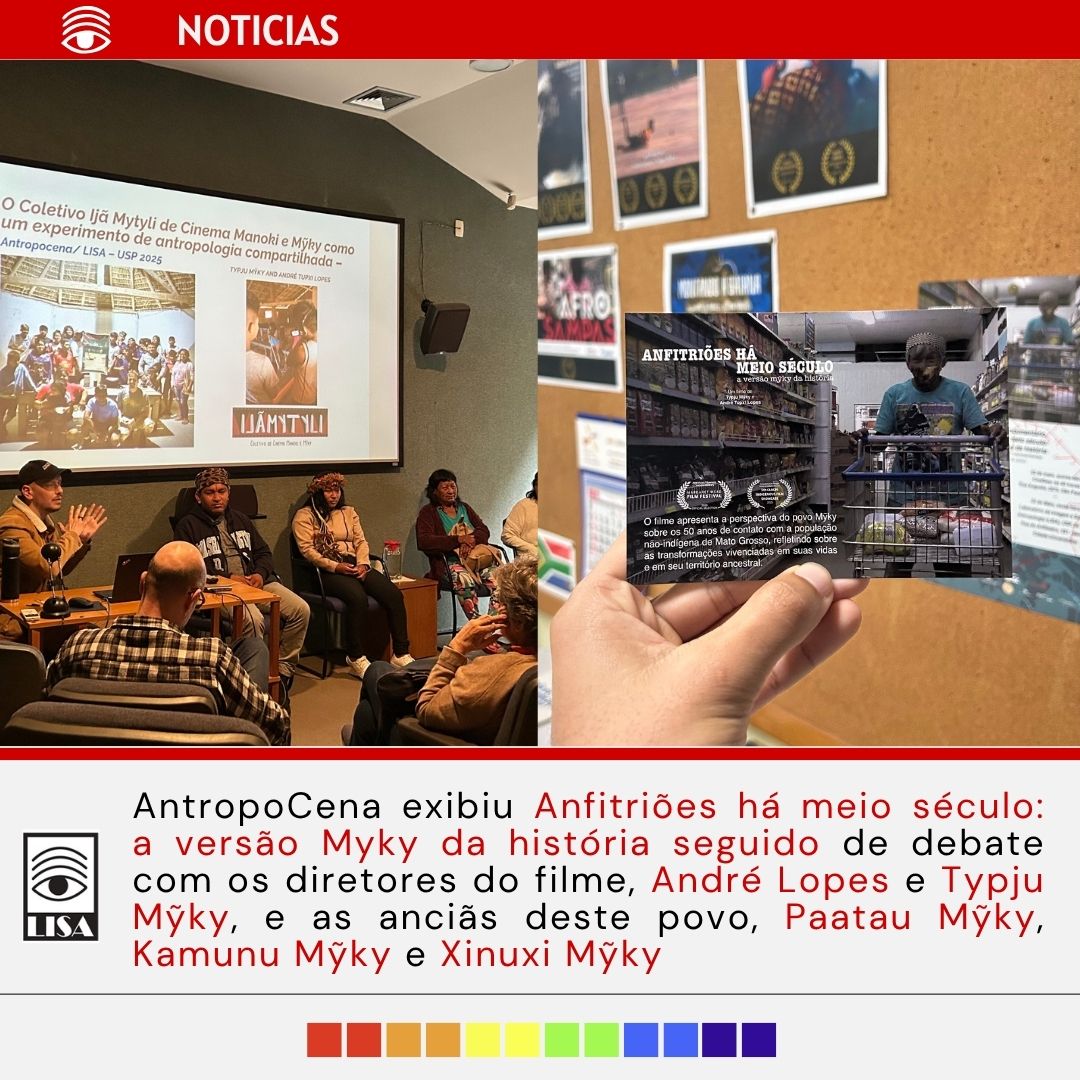Authorship: Maykon Cruz Almeida • LISA Scientific Journalism Scholarship
Art/Dissemination: Carlos Eduardo Conceição • LISA Scientific Dissemination Scholarship
Reviews: Sylvia Caiuby Novaes • Professor & LISA Founder | Vanessa Munhoz • LISA Communication
Published: 02/07/2025
Production in partnership with an indigenous film collective explains the transformations resulting from contact with the non-indigenous population
The session of the AntropoCena project on May 23, 2025, showed the film Hosts Half a Century Ago: The Myky Version of History and featured the participation of the film's directors, André Lopes and Typju Mỹky, and the elders of this people, Paatau Mỹky, Kamunu Mỹky and Xinuxi Mỹky. The Laboratory of Image and Sound in Anthropology (LISA-USP) hosted the premiere of the medium-length film, a notable production by the Ijã Mytyli Manoki and Myky Film Collective in co-production with LISA itself.
André Lopes holds a PhD in Social Anthropology from the School of Philosophy, Literature and Human Sciences at the University of São Paulo (FFLCH-USP) and won the 2024 USP Outstanding Thesis Award in the Innovation category with his thesis “Ijã Mytyli: The Manoki and the Mỹky in their new audiovisual paths-stories”. The researcher has been working with the Manokis of Mato Grosso since 2008 and has offered audiovisual production workshops to indigenous peoples since 2009. Typju Mỹky is an academic, filmmaker and Mỹky leader who has worked to tell the story of the Manoki and Mỹky through audiovisual production, which contributes to the rescue of their traditions and the maintenance of their culture and religion.
Started in 2019, the documentary shown is the result of collective work and a record of the emotions and struggles of these people. Through an engaging interplay of images, the viewer moves between the present and the past, between the current Mỹky village and images of ancient missionary expeditions. Recorded in the municipality of Brasnorte, in the northwest of the state of Mato Grosso (MT), the film covers and presents a long period of transformations brought about in the ancestral territory of the Mỹky people, through contact with the non-indigenous population in 1971. The film portrays the people's struggle for the demarcation of their sacred land and for daily survival in harmony with nature, prioritizing environmental conservation.
Throughout the documentary, elders share their experiences and offer a glimpse into life before the arrival of the white population. Their reflections address planting, harvesting, the daily challenges of buying food and the obstacles faced in keeping their culture and religion alive through the youth and the rescue of ancient traditions. According to reports, Brasnorte was once a large village that was constantly attacked by rubber tappers and colonizers. The Mỹky were forced to enter the forest, leaving behind their sacred place, where they lived by hunting and fishing. The arrival of the colonizers resulted in the devastation of the forest and the escape of the animals. Today, of approximately 170 people, only three elders still speak the traditional language.
The Ijã Mytyli Collective of Manoki and Mỹky Cinema
According to Typju, the Ijã Mytyli Collective of Manoki and Mỹky Cinema was born out of the need of the Manoki and Mỹky people to tell their own stories from their perspectives. Founded in 2020, the collective represents the union between Manoki and Mỹky filmmakers, who, even before the union, were already producing films in their communities with the support of André Lopes.
The cinematic journey among the Manoki began in 2009, marking the resumption of the initiation rite and the production of the feature film “The Baptism of the Manoki Boys”. Among the Mỹky, cinema began in 2016, at the initiative of Typju Mỹky, with the resumption of Ãjãí, a fun competition between the two communities, in which only the players’ heads can touch the ball, inspiring the film directed by Typju and Lopes, “Ãjãí: the head game of the Mỹky and Manoki”, produced by the Center for Amerindian Studies at the University of São Paulo (CEstA) and LISA.
The collective is a tool for struggle and expression. Through the productions and partnerships developed over the years, the two peoples can tell their versions of events to the non-indigenous population. The recordings are made in accordance with the interests of the communities, as they understand that this tool is another force for spreading respect and knowledge among different cultures, in addition to preserving knowledge and values for future generations.
Hosts for half a century: the Mỹky version of the story is one of those productions that exposes the hardships and adversities faced by indigenous peoples in Brazil, since their arrival and contact with the white population. Today, both the Mỹky people and the Manoki fight for the preservation of their stories, of what makes them exist as a community, and for the demarcation of their ancestral territory, essential for their harmonious survival.
The production had a preview at the 5th CLACPI Indigenous Film Festival, in New York and at the American Museum of Natural History, in the “Emerging Visual Anthropologist Showcase”, a special session of the Margaret Mead Film Festival. The premiere took place on May 22nd, at CineSesc, and May 23rd, at LISA-USP, with the presence of the filmmakers and the entourage of elderly women.
AntropoCena is a LISA initiative that aims to present to the community the audiovisual production produced, essentially, by USP researchers through sessions and debates with its creators.



